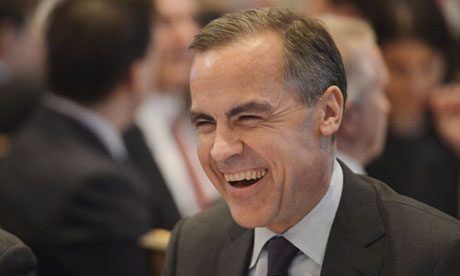 When the Office for Budget Responsibility recently delivered its pretty gloomy message about the state of the economy and the national finances to the chancellor, eyewitnesses were surprised at how relaxed George Osborne appeared to be.
When the Office for Budget Responsibility recently delivered its pretty gloomy message about the state of the economy and the national finances to the chancellor, eyewitnesses were surprised at how relaxed George Osborne appeared to be.The reason, apparently, was that the chancellor was so pleased with himself for having landed what he regards as his big catch – the Canadian Mark Carney for the job of governor of the Bank of England – that the implications of the OBR report for his imperilled strategy hardly sank in.
Now it may be that, having arrogantly dismissed any thought of a Plan B for the economy, Osborne for some time has been toying with what he might regard as a devilishly clever Plan C. That's C for Carney, the man he hopes will get him off the many hooks on which he has impaled himself, produce a dramatic economic recovery and lead the Conservatives to a triumphant election victory in 2015.
What does it matter that the OBR's version of the economy's prospects looks convincingly dreadful? We have a deus ex Canada about to descend, so we can laugh off the OBR report, especially when it gives us room to wrongfoot that irritating shadow chancellor.
There was no doubt that Ed Balls was wrongfooted; but I suspect not for long. Within days of the autumn statement, Robert Chote, the chairman of the OBR, was telling the Commons Treasury select committee: "Putting a lot of weight on a forecast that borrowing is going to fall or indeed rise by £1bn between one year and the next is ignoring the uncertainty. I certainly wouldn't be staking my reputation on a £1bn shift in the budget deficit from one year to the next."
Osborne and the Treasury had an easy time on autumn statement day, because they had managed expectations well and there was plenty of media speculation about the bad news from the OBR. However, Osborne may not be as clever as he thinks with his tactic of "divide and rule" when it comes to his assault on the poor.
Leaving aside the unfortunate fact that under modern capitalism many workers are paid so badly that the state finds it necessary to subsidise employees, and in effect employers, to provide a living wage, the practice of cutting benefits at all in present circumstances is highly debatable from a policy point of view.
We are experiencing a severe shortage of demand in the economy, and the austerity programme makes things worse, not better, quite apart from its punishing distributional effects. As that great old campaigner Michael Heseltine observed last week: "Government appears like villains, descending like Mongol hordes on the most vulnerable, leaving community welfare like bleeding stumps."
But let us return to the policymaker in the wings, Mark Carney: no cut in housing benefit for him. Indeed, the Treasury committee, when the governor-in-waiting appears before them, could do worse than ask how much he has managed to negotiate himself in housing allowances. Its members are not the only ones who may be in for a shock.
Last week Carney hit the headlines with a speech in Toronto which, despite his denials – which now, of course, have "previous" – has been widely interpreted as heralding a marked change in the approach to monetary policy, with a greater emphasis on growth and employment rather than the inflation target, which has been the holy grail for two decades now.
Of course it is the elected government of the day that is in ultimate charge of the regime in which the Bank of England is free to alter, or not, its interest rate – which in turn is supposed to set the example for other rates. It is not clear yet, for all the worship Carney is attracting, whether he is speaking with the approval of the chancellor or shooting from the hip. One recalls how, when Robin Leigh-Pemberton was made governor in 1983, he gave some unguarded interviews before arriving in Threadneedle Street, and was advised to keep his counsel.
Superficially, Carney appears to have a major change of policy in mind. He likes the idea of targeting nominal gross domestic product, ie real growth plus inflation rather than inflation alone. Sir Samuel Brittan has been advocating such a policy for decades in the Financial Times, although that great Treasury permanent secretary Sir Douglas Wass always maintained that for operational purposes nominal GDP was too much of a "lagging indicator".
There are also those who think that, by deliberately "aiming off" the inflation target, the Bank of England is already, in effect, halfway towards realising Carney's "revolutionary" change.
However as Stephen King, group chief economist of HSBC, points out: "There is over-optimism about what you are expecting to achieve from growth in terms of monetary policy."
Central bankers may have absorbed the lessons of the 1920s and 1930s, and not made the Great Recession worse via monetary policy. But governments in the UK and the eurozone have not learned those lessons. The austerity programmes here and across the channel are offsetting what the central banks are trying to achieve with monetary policy.
Things are bad for many reasons. But fiscal policy is making them a lot worse, with potentially dire implications for society.
Original Article
Source: guardian
Author: William Keegan
No comments:
Post a Comment